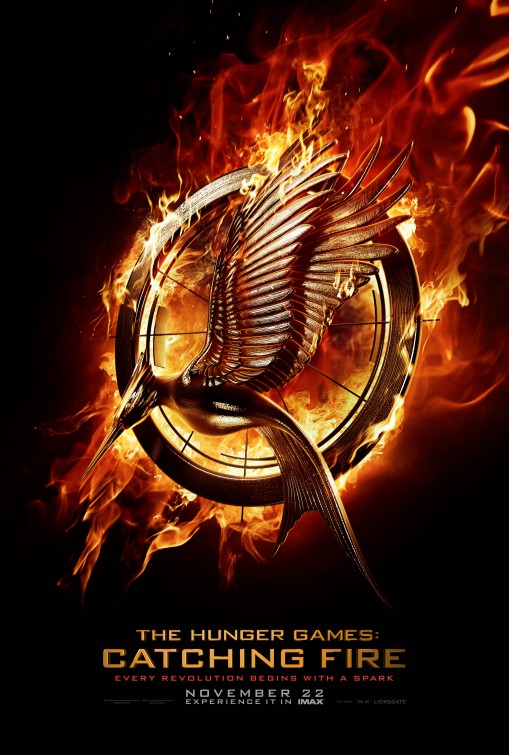The Hunger Games: Catching Fire (Francis Lawrence, 2013)
I did not like the first Hunger Games. As I wrote in my review of it last year, there seemed to be no raison d’être to the first movie other than the obvious one of cashing in on a bestselling series. The actors – especially the lead, Jennifer Lawrence, so good in films like Winter’s Bone and Silver Linings Playbook – gave lackluster performances, and looked too well-fed and healthy to convincingly portray members of a population existing at a bare subsistence level. Furthermore, the director, Gary Ross (Pleasantville, Seabiscuit), was incapable of staging action sequences with any sense of tension and danger. I was bored during the actual “Hunger Games” of the title. Given the built-in fan base for that movie, it is not surprising that it made money, but it was a dispiriting experience, and I was not alone in that assessment. Even Manohla Dargis of The New York Times, who liked the first film more than I did, notes, in her review of the sequel, my same points about Lawrence’s performance.
But let’s forget about all that. The Hunger Games: Catching Fire, with a new director, Francis Lawrence (I Am Legend, Water for Elephants, and no relation to the actress), at the helm, is quite fine entertainment. Whether through make-up, costume, lighting, post-production visual effects manipulation, and/or a radical workout and diet by all involved, the actors look like they actually belong in the dystopian world of Collins’s imagination. And they give actual performances. Katniss Everdeen (Lawrence) and her co-Hunger-Games-victor Peeta Mellark (Josh Hutcherson), behave as if they have the potential for some future love affair, and the steamy on-screen chemistry between Katniss and Gale (Liam Hemsworth, brother of Chris), makes this a love triangle with real heat. Ladies and Gentlemen, we have liftoff!
The story this time starts off in the months just after the end of The Hunger Games. Katniss, plagued by nightmares, and Peeta, gentle as always, now live in the Victors’ Village of their district, along with their mentor, Haymitch (Woody Harrelson, one of the few bright spots in film #1), trying to live as normal a life as possible. All is not well in the rest of Panem – as the post-apocalyptic remnants of the United States are called – however, as Katniss’s act of defiance at the end of the last games – her refusal to kill Peeta by threatening to have them both eat poisonous berries, thereby leaving the games without a victor – has lit a spark in the tinderbox of rebellion, and mutinies are breaking out in various districts. Before she and Peeta are to begin the traditional post-game victory tour, President Snow (a good Donald Sutherland) pays a visit to Katniss, warning her that unless she can convince all of Panem that her actions were motivated solely by love of Peeta, and not by thoughts of revolution, he will kill her family and all those she loves. To drive home his point, he shows her surveillance footage of a surreptitious kiss she has shared with her lifelong friend Gale. Unfortunately, the tour does not go well. Once begun, the mutinous fires are hard to stamp out. Angry, Snow calls for a special new edition of the Hunger Games, in honor of the 75th anniversary of their founding: the tributes from each district will be chosen from among the remaining living victors. And so Katniss and Peeta head back to the capitol to fight again.
It’s a strong set-up, and finely rendered by cast and crew, alike. The look of the film this time around is more wintry and blue, and this color palette serves the story well. The world-weariness of the victors as they are all – much to their horror and anger – called back to the capitol is perfectly captured by performers like Jeffery Wright, Amanda Plummer, Jena Malone and Sam Claflin (a well-chosen cast). Finally, the action sequences, once the new games begin, are engaging and terrifying. This is commercial filmmaking at its best.
Perhaps, as the movies go on, their quality trajectory will be the reverse of that of the books: I liked Collins’s The Hunger Games, very much, but with each subsequent novel her writing and plotting felt sloppier and rushed. If the next two movies are even close to the quality of Catching Fire, then the movie series should end strongly. Why, though, are they splitting up the last book into two films, Mockingjay, Part 1 and Part 2? The answer, of course, is money (again), and the fact that the Harry Potter film series paved the way, with Deathly Hallows, Part 1 and Part 2, followed closely by Twilight‘s Breaking Dawn, Part 1 and Part 2. The filmmakers should be careful, lest they fall into the same trap as they did with Hunger Games #1: when your motivation is solely your paycheck, you’re a lot less likely to be inspired to set everyone else’s hearts on fire. For now, however, let us be grateful that #2 has fire, and lots of it.


2 Comments